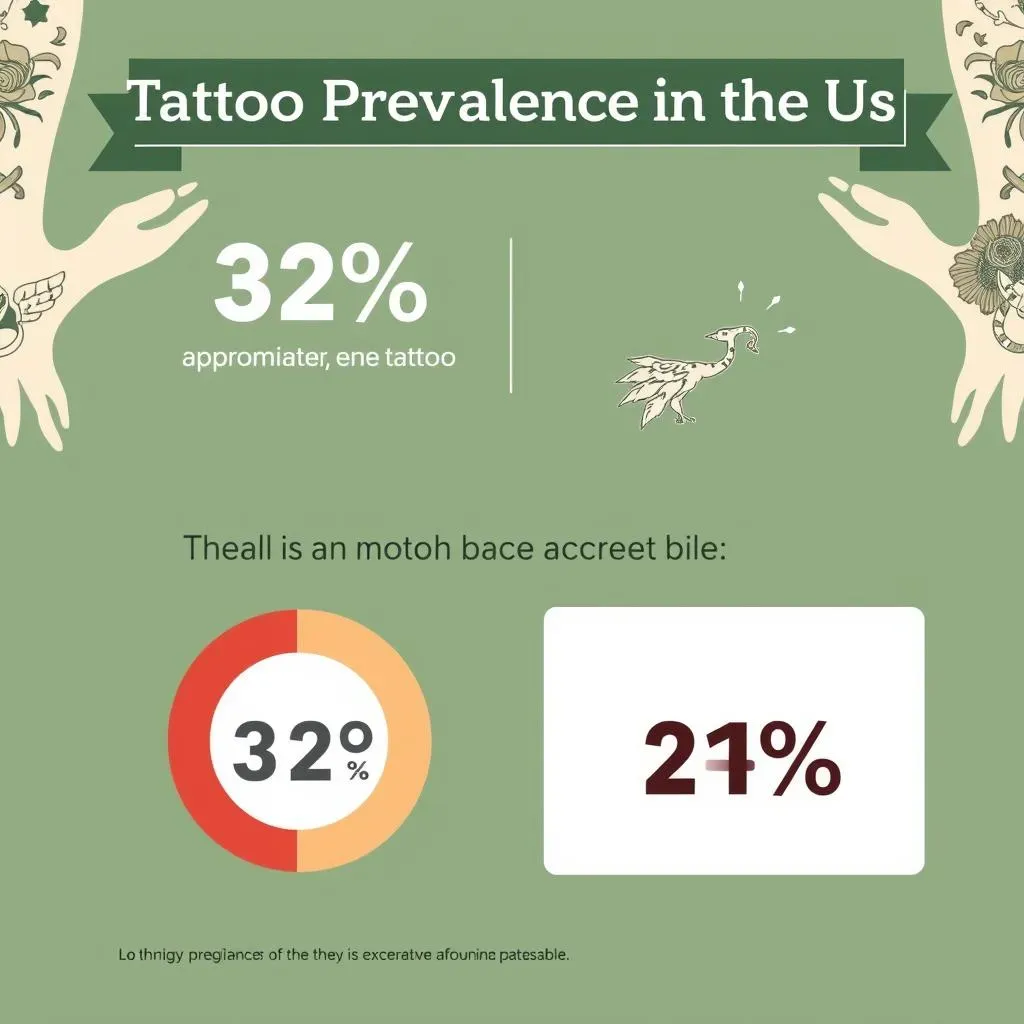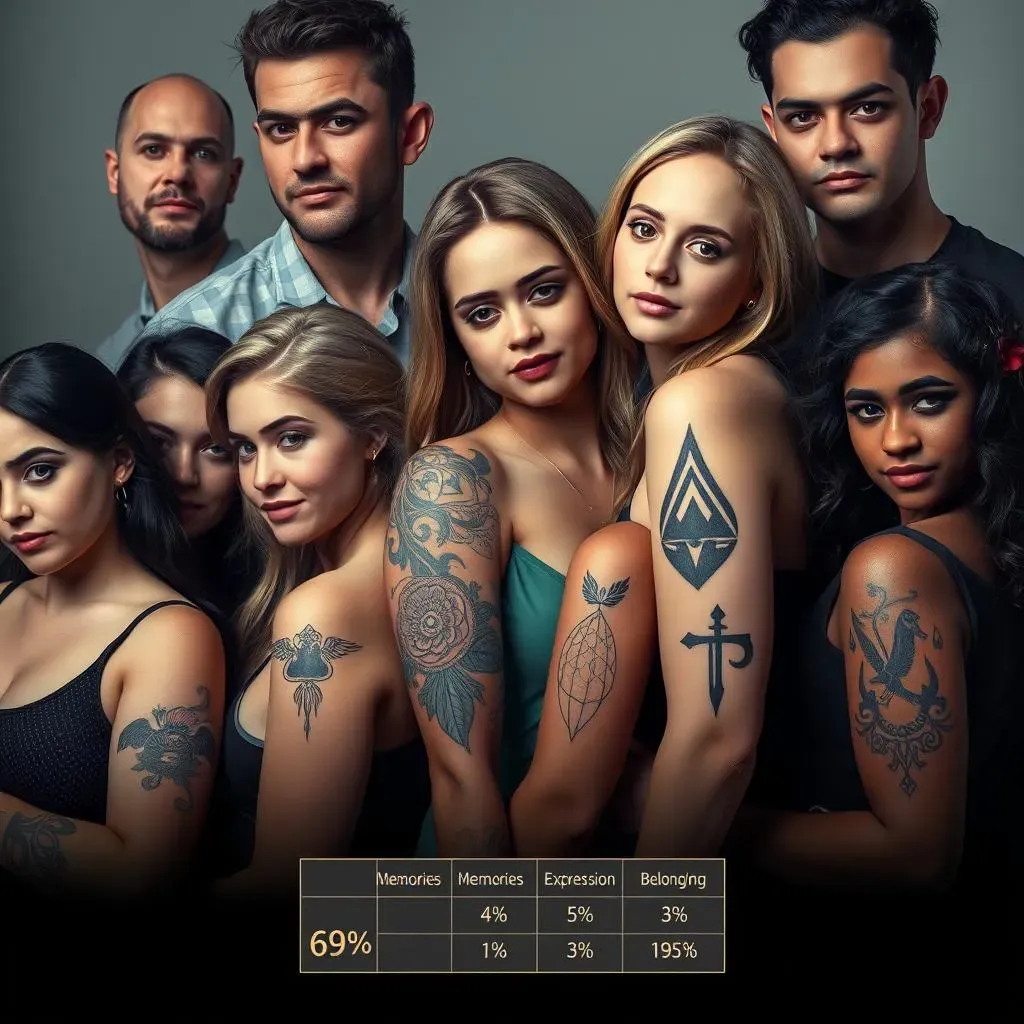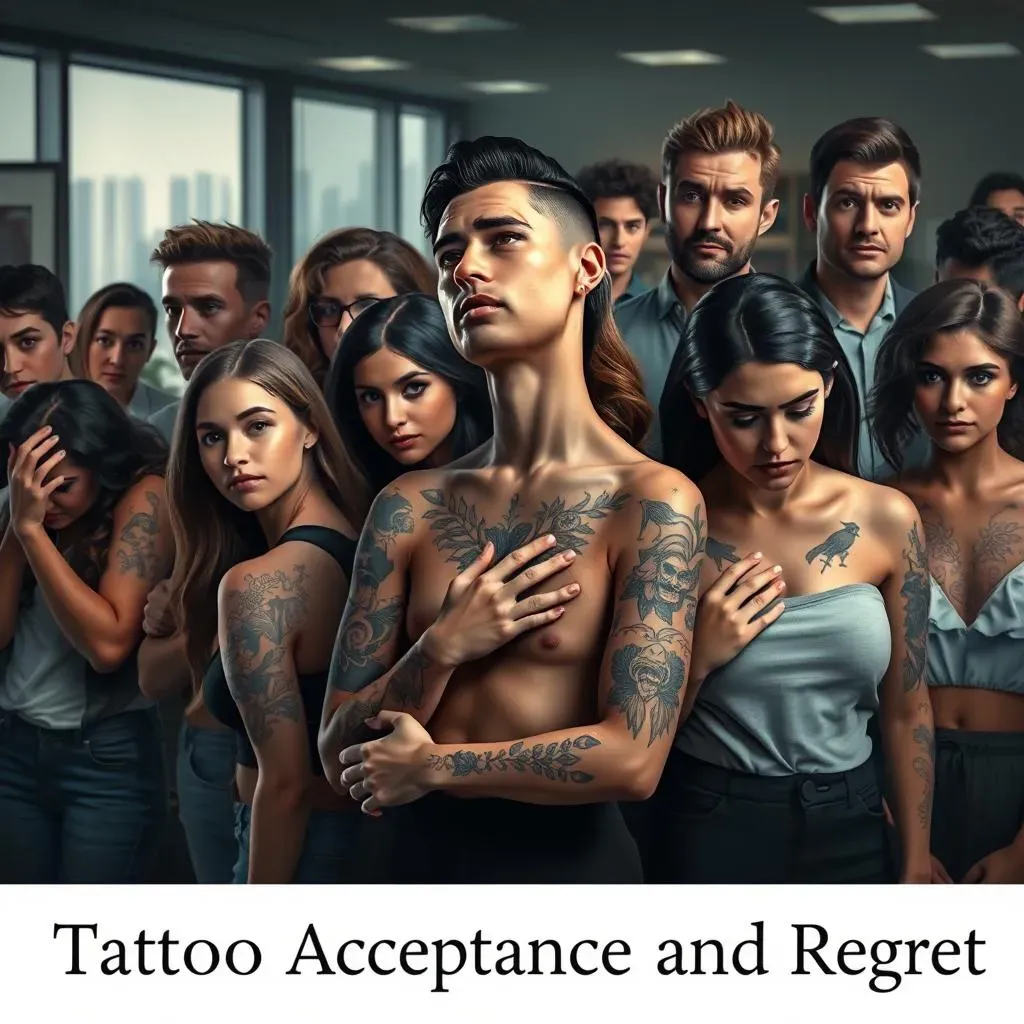Table of Contents
Tattoos, once relegated to the fringes of society, have surged into the mainstream. Have tattoos become a ubiquitous form of self-expression? A recent study by the Pew Research Center sheds light on the evolving landscape of body art in America. Approximately 32% of Americans sport at least one tattoo, a figure that underscores the growing acceptance and popularity of this art form. But beyond the numbers, what are the driving forces behind this trend? Why do people choose to have tattoos, and how does society perceive individuals adorned with ink? This article delves into the heart of the matter, exploring the prevalence of tattoos, the motivations behind them, and the shifting societal attitudes towards body art. We'll examine the demographics of tattoo enthusiasts, the reasons they choose to get inked, and the surprising rates of regret among those who have taken the plunge. Join us as we navigate the intricate world of tattoos, uncovering the stories and perspectives that lie beneath the surface.
Tattoo Prevalence: How Many Americans Have Tattoos?
Tattoo Prevalence: How Many Americans Have Tattoos?
So, how many people are actually inked up these days? The Pew Research Center's study reveals that nearly a third of the US population, around 32%, have at least one tattoo. It's not just a small fraction anymore; it's a significant portion of the population sporting some kind of body art. What’s even more interesting is that 22% of these tattooed individuals have more than one. This suggests that for many, getting a tattoo isn't a one-time decision, but rather an ongoing form of self-expression.
Why People Have Tattoos and the Reasons Behind Them
Why People Have Tattoos and the Reasons Behind Them
Honoring Memories: The Primary Driver
So, what's the big motivator? Turns out, for a whopping 69% of tattooed adults, it's about honoring or remembering someone or something. Think about it: a tribute to a beloved grandparent, a memorial for a lost pet, or a symbol representing a significant life event. Tattoos become permanent reminders, etched onto the skin as a way to keep cherished memories alive. It's a deeply personal act, transforming the body into a canvas of remembrance. My cousin, for example, got a tattoo of his dog's paw print after he passed away. He said it was a way to keep him close, a constant reminder of their bond.
It's not just about sadness, though. Many people use tattoos to commemorate positive experiences, like a graduation date, a wedding anniversary, or the birth of a child. These tattoos serve as milestones, visual representations of joy and achievement. I once met a woman who had a small anchor tattooed on her wrist, she explained that it represented the strength she found within herself during a difficult period of her life.
Beyond Remembrance: Self-Expression and Individuality
While honoring memories is a major factor, self-expression and individuality also play a crucial role. People want to stand out, to showcase their unique personalities and beliefs. A tattoo can be a powerful statement, a way to declare your identity to the world. Think of someone with a vibrant, colorful sleeve tattoo depicting their favorite fantasy characters or a minimalist design that reflects their philosophical outlook. Each tattoo tells a story, offering a glimpse into the wearer's inner world.
It's also about belonging. Sometimes people get tattoos to feel connected to a group or community. Maybe it's a shared symbol among friends, a team logo, or a design that represents a cultural heritage. These tattoos create a sense of camaraderie, forging bonds through shared ink. It’s like a secret handshake, a visible sign of belonging.
Reason for Tattoo | Percentage of Tattooed Adults |
|---|---|
Honor/Remember Someone/Something | 69% |
Self-Expression/Individuality | Varies (Significant Percentage) |
Belonging/Community | Varies (Depends on Group) |
Tattoo Acceptance and Regret: Societal Views and Personal Reflections on Having Tattoos
Tattoo Acceptance and Regret: Societal Views and Personal Reflections on Having Tattoos
Shifting Tides: Societal Acceptance of Tattoos
Remember when tattoos were mainly associated with sailors, bikers, and rebels? Those days are fading fast. According to the Pew Research Center, a whopping 80% of US adults believe that society has become more accepting of people with tattoos in recent decades. That's a massive shift! It's not just about tolerating tattoos; it's about embracing them as a legitimate form of self-expression. You see tattoos everywhere now – in offices, classrooms, even the halls of Congress. This growing acceptance is likely fueled by the increasing visibility of tattoos in popular culture, from celebrities sporting intricate designs to everyday people proudly displaying their ink.
I think social media has also played a big role. Platforms like Instagram and Pinterest have become virtual tattoo parlors, showcasing an endless array of styles and designs. This exposure normalizes tattoos, making them seem less intimidating and more accessible to a wider audience. Plus, the stigma associated with tattoos is slowly eroding as more and more people from diverse backgrounds choose to get inked.
The Regret Factor: Are Tattoos Forever?
so society's more accepting, but what about the people who have tattoos? Do they ever regret their decisions? The survey reveals that about a quarter of tattooed Americans (around 25%) have regrets about one or more of their tattoos. That's a significant number! It makes you wonder what factors contribute to tattoo regret. Maybe it was a spur-of-the-moment decision fueled by youthful impulsiveness, or perhaps the design no longer reflects their current values or aesthetic preferences.
Laser tattoo removal has become a booming business, a testament to the fact that not all tattoos are forever. I've heard stories of people regretting names of ex-partners, poorly executed designs, or tattoos that simply don't align with their professional aspirations. It's a reminder that tattoos, while often deeply meaningful, are also permanent marks on the body, and careful consideration is essential before taking the plunge. Think before you ink, folks!
Factor | Possible Consequence |
|---|---|
Impulsive Decision | Regret due to changing preferences |
Poor Design/Execution | Dissatisfaction with appearance |
Changing Values | Tattoo no longer aligns with beliefs |
Professional Aspirations | Tattoo may hinder career opportunities |
Future Ink: Tattoo Plans and Perceptions
What about the tattoo-free folks out there? Are they tempted to join the inked ranks? The survey indicates that most Americans without tattoos don't plan to get one, but younger adults are more open to the idea. This suggests that the tattoo trend is likely to continue, with younger generations leading the charge. It's also interesting to note that seeing someone with a tattoo doesn't significantly impact the impression of that person for most Americans without tattoos. This further reinforces the idea that tattoos are becoming increasingly normalized, losing their power to shock or offend.
However, perceptions can still vary depending on the context. A small, discreet tattoo might be perfectly acceptable in a professional setting, while a large, visible tattoo could still raise eyebrows in more conservative industries. It's a delicate balance between self-expression and societal expectations. Ultimately, the decision to get a tattoo is a personal one, and it's important to weigh the potential benefits and drawbacks before making a commitment to permanent ink.
Conclusion: The Evolving Canvas of American Identity
As tattoos become more commonplace, they reflect a broader shift in how we express ourselves and perceive others. While a significant portion of the population embraces tattoos as a form of personal storytelling, individual motivations and societal acceptance continue to shape the narrative. The prevalence of tattoos underscores a move towards greater self-expression, yet the rates of regret serve as a reminder of the permanence of the decision. Ultimately, the evolving canvas of American identity is being inked with stories, memories, and meanings, one tattoo at a time.